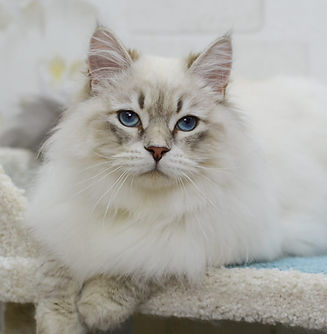

Grace Siberians
Hypoallergenic Kittens Bred to Royal Purr-fection
(360)871-7777
Shawna's


We are proud to have served elite clientele, corporate companies, and families with our commitment to providing lifelong healthy kittens. Our focus is delivering the same outstanding personal service to everyone, allowing all to experience the joy that our Siberian kittens offer. Our passion for this wonderful breed shines through in the care and attention we provide to each kitten. Explore our site to learn more about our breeding practices and available kittens!
The Carolina's Premier Siberian Cat Breeder
Siberian Cat Information
What is a Siberian cat?
Siberian cats are native to Russia, where they’ve thrived in forested regions for at least 1,000 years – you may even hear reference to them as a Siberian forest cat. With Russia’s harsh, snowy climate, this breed relies on their heavy coat and bushy tail to keep warm.
Even though it’s an old breed, Siberian cats didn’t hit the U.S. until the 1990s and their popularity has grown ever since. Modern long-haired cats are actually said to be descendants of the Siberian cat.
Siberian cats have medium to large, muscular bodies. Their average weight is 15–20 pounds, and they can measure 17 to 25 inches in length.
Siberian kittens don’t reach full adulthood until they’re about five years old.
Healthy Siberians can have a lifespan of between 12 and 15 years.
How much grooming does a Siberian cat need?
Siberian cats have thick coats but only molt twice a year – otherwise, they typically don’t shed too badly. You can expect your fur baby to lose hair during the spring and fall to make way for warm and cold weather.
Aim to brush your Siberian cat at least twice a week to prevent knots and mats. This breed also typically doesn’t mind water — in fact, they may even appreciate having a bath once a month.
You’ll also need to look after your Siberian’s claws by using a cat nail clipper on them every two weeks. If you’re nervous about cutting your kitty’s nails for the first time, ask your vet to show you how to do it.
It’s also important to brush your Siberian cat’s teeth twice a week and take them for yearly checkups. Keeping your cat’s teeth and gums healthy will reduce the risk of dental disease. You should also look in your cat’s ears every week and gently wipe away any wax or dirt that builds up.
What can you expect from the Siberian cat personality?
1. Affectionate
While Siberian cats have a wild history of roaming subarctic climate forests, these cats make affectionate household companions and adore their pet parents.
Siberian cats enjoy snuggles and will sit happily on your lap. They’ll follow you around and welcome you when you get home after being away. Despite this, this is a patient breed that’s not overly possessive of its owners.
If they’re bought up around children and other pets, your Siberian will be the best of friends with them. They’re usually not shy around strangers and are content in most living environments.
2. Vocal
Siberian cats can be vocal. Your feline friend will tell you when they’re hungry and when they’re in pain. If you’ve just arrived home after being gone for a while, they might be extra chatty.
These intelligent kitties will remember your reactions to their vocalizations. If you respond to their sounds by giving them what they want, they’ll keep doing it.
The Siberian cat is a breed that also purrs a lot. Purring is a sign that they’re happy and comfortable in their living environment. You can expect your kitty’s little motor to be going while you cuddle!
3. Playful
Cats from the Siberian feline family take longer to mature than other breeds. This means that your cat will act like a kitten until they’re around five years old.
Siberian cats can be very playful and enjoy exploring. They’ll be curious about new toys but aren’t usually destructive, but make sure you have a scratching post available for them to flex their claws whenever the urge strikes.
While they love to play, they have more of a medium activity level, so you’ll still get plenty of downtime if you own one of these felines.
Siberian cats also provide excellent rodent control and will hunt down any mouse that dares to enter their line of sight.
With this big personality, it’s important for Siberian owners to keep their fur babies entertained. Spend some time each day playing with your cat – they’ll likely enjoy chasing feather toys and lights, and a cat tree will help keep them happy when you’re away from home.
4. Adaptable
Another common personality trait for this breed is adaptability. As long as your Siberian cat is with their favorite people, they won’t care where you live.
Siberian cats will usually adjust quickly to — and even welcome — new family members, whether that be a baby, partner, or pet.
These felines aren’t typically skittish either. If you have a household full of loud children, for instance, your Siberian cat will usually adapt.
5. Bold
Siberian cats are typically cool, calm, and confident. This bold breed is friendly and in tune with their owner’s emotions.
If you have a visitor to your house or there’s a noise, your brave kitty may come out to investigate rather than run and hide.
Your cat will be devoted and loving but still independent. As long as your Siberian has toys and a comfortable place to sleep, you’ll be able to leave them home alone during the day.


